| Life Isn't Fair...
30 October 2000
For the past five weeks, we have had a retired priest from the United States living with us (Maryknoll) in Phnom Penh. Formerly a Maryknoll associate priest himself and head of Maryknoll's Peace and Justice Office, he came to learn about mission work in Asia. Today he came home for lunch, complained that he thought a migraine was coming on, and went to lie down. When we checked on him a few minutes later, he seemed a bit disoriented and was also experiencing some memory loss and loss of peripheral vision. A doctor from one of the Maryknoll projects was at our center and he immediately felt that our friend had suffered a slight stroke.
At that point we took him to SOS International, a medical and evacuation service we use when appropriate medical care may not be available in mission countries. Within hours he was on a plane to Bangkok, accompanied by a nurse, with a hospital in Thailand waiting for him.
That possibility and the availability of medical care out of the reach of the people we work with is a constant tension. We come to work with the poor and to try and live with them and as much like them as possible, and yet we always have that evacuation insurance to fall back on while my motordupe driver borrows $1.50 from me to get some prescription medicine from a pharmacist who has no training except for watching his father dispense medicine. He'll never see a doctor. Or even worse, he'll go to one of the kroo thmai, a traditional healer, many of whose treatments are highly suspect and even deadly.
Many of our new Maryknoll personnel, really enthusiastic and dedicated to the idea of mission with the poor, are especially vulnerable to the "live-like-the-natives" ideal and need supervision when they become sick to insure they receive proper treatment. We have sad experience here in Asia to help them realize the wisdom of being treated well. A young Maryknoll priest in Bangladesh was bitten by a puppy--as was the father of a family he was visiting, and not wanting to accept treatment not available to the common people, he did not get rabies shots. He died a very horrible death from rabies a few months later. The mother of the poor family, on the other hand, sold everything necessary to make sure her husband got the shots, and he lived. When one of us westerners tries to "go native," everyone loses.
|
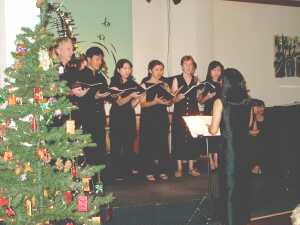 With a 98% Buddhist and Muslim population, Cambodia does not celebrate Christmas very extensively. Probably close to 90% of the people wouldn't even have heard of Christmas. But tonight the Bella Voce choir had a short concert of Christmas carols in the lobby bar of the Cambodiana Hotel. It lasted only about an hour but the room was jammed and the overflow sat on the floor. Our own Dr. Helene Morhan who works in the Seedling of Hope AIDS project was one of the 13 singers. They were accompanied by two musicians from the University of Phnom Penh's School of Fine Arts. An enjoyable evening!
With a 98% Buddhist and Muslim population, Cambodia does not celebrate Christmas very extensively. Probably close to 90% of the people wouldn't even have heard of Christmas. But tonight the Bella Voce choir had a short concert of Christmas carols in the lobby bar of the Cambodiana Hotel. It lasted only about an hour but the room was jammed and the overflow sat on the floor. Our own Dr. Helene Morhan who works in the Seedling of Hope AIDS project was one of the 13 singers. They were accompanied by two musicians from the University of Phnom Penh's School of Fine Arts. An enjoyable evening!

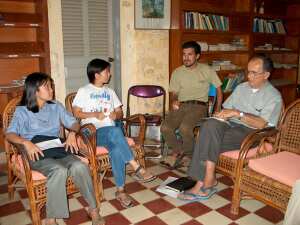 Cambodia is probably unique in the Catholic missionary world for the mixture of different sending groups which have lay missioners working here. Recognizing a need to get together for growth and support, most of the approximately 25-30 lay missioners meet on the first Sunday of each month. Today's December gathering, planned by the Hong Kong lay mission group, saw the bishop, Emile Destombs, meeting with us for a discussion about the role of lay missioners and then a liturgy together followed by dinner in a Chinese restaurant. In this picture three lay missioners from the Philippines, Hong Kong, and Argentina listen to Bishop Emile.
Cambodia is probably unique in the Catholic missionary world for the mixture of different sending groups which have lay missioners working here. Recognizing a need to get together for growth and support, most of the approximately 25-30 lay missioners meet on the first Sunday of each month. Today's December gathering, planned by the Hong Kong lay mission group, saw the bishop, Emile Destombs, meeting with us for a discussion about the role of lay missioners and then a liturgy together followed by dinner in a Chinese restaurant. In this picture three lay missioners from the Philippines, Hong Kong, and Argentina listen to Bishop Emile.
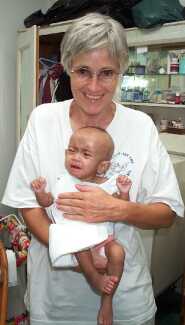 A year and six days ago, a little boy was born to a mother with AIDS who died a few hours later. With no other family and possibly infected with AIDS himself, the baby--who weighed just two and a half pounds--faced a difficult future. Fran Kemmerer, a Maryknoll lay missioner who works at Seedling of Hope where the mother was being treated, took in the boy who was nicknamed Sweet Baby James. Fran took wonderful care of James and gave him all the love a baby should have, but his body never was able to catch up with his spirit. Hospitalized last week, it was determined that the IVs he had were only prolonging the inevitable and Fran took him home to wait for the end. It came last night. This picture shows Fran and James the night before we left to come to Thailand.
A year and six days ago, a little boy was born to a mother with AIDS who died a few hours later. With no other family and possibly infected with AIDS himself, the baby--who weighed just two and a half pounds--faced a difficult future. Fran Kemmerer, a Maryknoll lay missioner who works at Seedling of Hope where the mother was being treated, took in the boy who was nicknamed Sweet Baby James. Fran took wonderful care of James and gave him all the love a baby should have, but his body never was able to catch up with his spirit. Hospitalized last week, it was determined that the IVs he had were only prolonging the inevitable and Fran took him home to wait for the end. It came last night. This picture shows Fran and James the night before we left to come to Thailand.
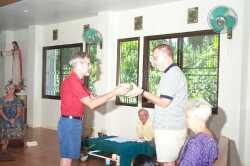 The newest member of Maryknoll Cambodia is Ed McGovern, a Maryknoll seminarian beginning his Overseas Traiining Program. He will be living and studying in Cambodia for the next 2 1/2 years, living at the Big House with Jim Noonan and me. Here he receives part of a welcome gift from me at a ceremony on the opening day of our meetings at Hua Hin, Thailand.
The newest member of Maryknoll Cambodia is Ed McGovern, a Maryknoll seminarian beginning his Overseas Traiining Program. He will be living and studying in Cambodia for the next 2 1/2 years, living at the Big House with Jim Noonan and me. Here he receives part of a welcome gift from me at a ceremony on the opening day of our meetings at Hua Hin, Thailand.
 This summer, Casey Sterr, a Maryknoll seminarian, was with us for almost three months. He studied Khmer language a few days a week, and jumped energetically into exploring all the projects of Maryknoll and of other NGOs in Cambodia. Because of his energy and desire to learn, he got quite a full picture of the situation in Cambodia in a relatively short time. Together with the the two students from Notre Dame, Amy Braun and Whitney Thompson, he was a very welcome addition to the Maryknoll team here. But today he headed back to the US to resume his theological studies in a few weeks at Chicago.
This summer, Casey Sterr, a Maryknoll seminarian, was with us for almost three months. He studied Khmer language a few days a week, and jumped energetically into exploring all the projects of Maryknoll and of other NGOs in Cambodia. Because of his energy and desire to learn, he got quite a full picture of the situation in Cambodia in a relatively short time. Together with the the two students from Notre Dame, Amy Braun and Whitney Thompson, he was a very welcome addition to the Maryknoll team here. But today he headed back to the US to resume his theological studies in a few weeks at Chicago.
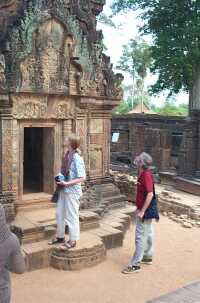 Banteay Srei is a small jewel of a temple ruins about 15 miles from Angkor Wat. Because of the factional fighting in the area up till 1998 and because of the extremely bad road leading to it, very few visitors found their way there in past years. A US woman was shot and killed on the road in a grenade and rocket attack in 1995. But now that the mines are gone and the road repaired, the tourists are starting to rediscover this site with some of the most exquisite stone carvings in Cambodia. "Srei" means "woman" in Khmer and the temple itself is a special pink sandstone and the carvings extremely delicate and well-preserved. We visited there early last year (that's Rachel Smith and I near the central core of the complex in the photo), but now since airlines are allowed to fly directly to Siem Reap, the number of visitors has doubled in six months. And those are the foreign visitors. The local people are rediscovering Banteay Srei also; last year during one three-hour period during Khmer new year, 7,000 people visited the complex. The human traffic is starting to take a toll, and so in June of this year the central core was roped off and visitors are no longer allowed inside. Fortunately the scale of the Banteay Srei is rather small so that even with the ropes, visitors are only a few meters from the carvings, but now they cannot touch them.
Banteay Srei is a small jewel of a temple ruins about 15 miles from Angkor Wat. Because of the factional fighting in the area up till 1998 and because of the extremely bad road leading to it, very few visitors found their way there in past years. A US woman was shot and killed on the road in a grenade and rocket attack in 1995. But now that the mines are gone and the road repaired, the tourists are starting to rediscover this site with some of the most exquisite stone carvings in Cambodia. "Srei" means "woman" in Khmer and the temple itself is a special pink sandstone and the carvings extremely delicate and well-preserved. We visited there early last year (that's Rachel Smith and I near the central core of the complex in the photo), but now since airlines are allowed to fly directly to Siem Reap, the number of visitors has doubled in six months. And those are the foreign visitors. The local people are rediscovering Banteay Srei also; last year during one three-hour period during Khmer new year, 7,000 people visited the complex. The human traffic is starting to take a toll, and so in June of this year the central core was roped off and visitors are no longer allowed inside. Fortunately the scale of the Banteay Srei is rather small so that even with the ropes, visitors are only a few meters from the carvings, but now they cannot touch them.
 The land given by the government to Krousar Thmey, a French NGO, for their deaf school and blind school here in Phnom Penh is along the river and prone to flooding. So at the deaf school, the buildings were built up on concrete foundations that are higher than the normal flood levels. The problem is that last year's annual floods were the worst in 70 years and this year's floods are already above the normal mark with a month or more to go. Krousar Thmey has a month-long training session for their deaf teachers every year during the summer vacation, and it was supposed to start yesterday at the Phnom Penh school. But the flood waters went into the buildings ahead of the teachers, so the whole program was moved to KT's school in Siem Reap today.
The land given by the government to Krousar Thmey, a French NGO, for their deaf school and blind school here in Phnom Penh is along the river and prone to flooding. So at the deaf school, the buildings were built up on concrete foundations that are higher than the normal flood levels. The problem is that last year's annual floods were the worst in 70 years and this year's floods are already above the normal mark with a month or more to go. Krousar Thmey has a month-long training session for their deaf teachers every year during the summer vacation, and it was supposed to start yesterday at the Phnom Penh school. But the flood waters went into the buildings ahead of the teachers, so the whole program was moved to KT's school in Siem Reap today.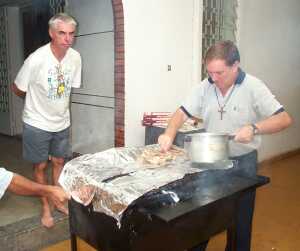 The Fourth of July is not a holiday here, of course, so all of us went about our normal jobs before our regular Wednesday afternoon Maryknoll meeting. Then we had our usual liturgy which was followed this week by a special cook-out organized by John and Kathy Tucker, borrowing from some of their Texas BBQ traditions. John had had a BBQ grill made--it just arrived today--and he took personal charge of cooking chicken, hamburgers, hotdogs, and ribs for us and four or five friends from Australia, France, and Belgium. It was great! Sr. Luise Ahrens smuggled in some sparklers on her last return trip here. But during the afternoon there were some real fireworks, too, as supposedly a dissident group set off bombs in two hotels. We still don't know much about what happened, but I heard one of the bombs go off.
The Fourth of July is not a holiday here, of course, so all of us went about our normal jobs before our regular Wednesday afternoon Maryknoll meeting. Then we had our usual liturgy which was followed this week by a special cook-out organized by John and Kathy Tucker, borrowing from some of their Texas BBQ traditions. John had had a BBQ grill made--it just arrived today--and he took personal charge of cooking chicken, hamburgers, hotdogs, and ribs for us and four or five friends from Australia, France, and Belgium. It was great! Sr. Luise Ahrens smuggled in some sparklers on her last return trip here. But during the afternoon there were some real fireworks, too, as supposedly a dissident group set off bombs in two hotels. We still don't know much about what happened, but I heard one of the bombs go off.
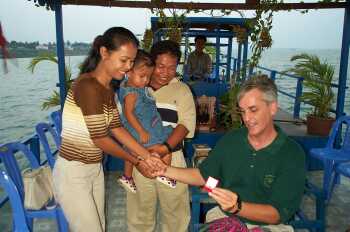 On Monday, 16 April, John Barth will return to the United States to work in the development department of Maryknoll in the New York area. His new duties will include school talks, weekend presentations in area parishes, interviewing prospective recruits, etc. John has been in Cambodia ever since his ordination nine years ago so his leaving now is difficult. His friends and colleagues have kept him busy saying goodbye the last couple weeks. Wednesday was Maryknoll's turn to bid him farewell and we took a boat ride on the Mekong as a leisurely way to spend some time with John. Here he is accepting more of the gifts that have come his way recently.
On Monday, 16 April, John Barth will return to the United States to work in the development department of Maryknoll in the New York area. His new duties will include school talks, weekend presentations in area parishes, interviewing prospective recruits, etc. John has been in Cambodia ever since his ordination nine years ago so his leaving now is difficult. His friends and colleagues have kept him busy saying goodbye the last couple weeks. Wednesday was Maryknoll's turn to bid him farewell and we took a boat ride on the Mekong as a leisurely way to spend some time with John. Here he is accepting more of the gifts that have come his way recently.
 This week, April 3-6, the Disability Action Council is sponsoring a workshop--funded by UNESCO--on Education of Children with Disabilities. Yesterday, in one of the small groups, one participant pointed out one of the vicious circles of life in Cambodia. Many people suffer disabilities because of the extreme poverty here. Families cannot afford pre-natal care or care after birth and so children are susceptible to all sorts of preventable disabling conditions. Even programs like vaccination against polio have only been partially carried out here so that Cambodia still has new cases of polio. Then when a family has a child with disability, they must spend money they don't have for transportation for services that are mostly unavailable and often not that good anyway; for medicines; and for all sorts of hoped-for cures and relief that is often pure quackery. In the search for help, families borrow money, are unable to repay the loans--usually just a few dollars--and then must sell their land to make the payments. Then they have joined the growing class of landless impoverished people who have nowhere to turn.
This week, April 3-6, the Disability Action Council is sponsoring a workshop--funded by UNESCO--on Education of Children with Disabilities. Yesterday, in one of the small groups, one participant pointed out one of the vicious circles of life in Cambodia. Many people suffer disabilities because of the extreme poverty here. Families cannot afford pre-natal care or care after birth and so children are susceptible to all sorts of preventable disabling conditions. Even programs like vaccination against polio have only been partially carried out here so that Cambodia still has new cases of polio. Then when a family has a child with disability, they must spend money they don't have for transportation for services that are mostly unavailable and often not that good anyway; for medicines; and for all sorts of hoped-for cures and relief that is often pure quackery. In the search for help, families borrow money, are unable to repay the loans--usually just a few dollars--and then must sell their land to make the payments. Then they have joined the growing class of landless impoverished people who have nowhere to turn.
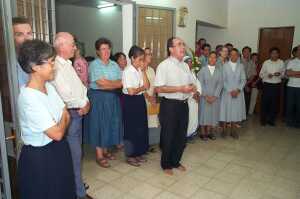 One of the advantages of being part of the Catholic church here in Phnom Penh is that we're small enough to get together and really know each other. On Sunday night the two French bishops invited the priests and sisters and lay missioners to a dinner at their house, an informal but really enjoyable opportunity to meet new faces and renew acquaintance with friends who may be scattered over the country.
One of the advantages of being part of the Catholic church here in Phnom Penh is that we're small enough to get together and really know each other. On Sunday night the two French bishops invited the priests and sisters and lay missioners to a dinner at their house, an informal but really enjoyable opportunity to meet new faces and renew acquaintance with friends who may be scattered over the country.
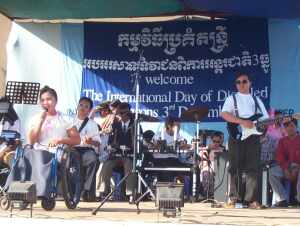 Today was the International Day of the Disabled and Phnom Penh had a celebration in a park near the royal palace. Maryknoll was well represented: Rachel Smith works for the Disability Action Council which organized the event; John Barth and other Maryknollers trained the blind musicians who provided the music; Kim Mom and others set up and run the Wat Than Skills Training Workshop which had an exhibit there; and Charlie Dittmeier works with the Cambodian Disabled People's Organization, one of the main participants in today's activities.
Today was the International Day of the Disabled and Phnom Penh had a celebration in a park near the royal palace. Maryknoll was well represented: Rachel Smith works for the Disability Action Council which organized the event; John Barth and other Maryknollers trained the blind musicians who provided the music; Kim Mom and others set up and run the Wat Than Skills Training Workshop which had an exhibit there; and Charlie Dittmeier works with the Cambodian Disabled People's Organization, one of the main participants in today's activities.
 Even when I lived in India and was in daily contact with Hindu believers, the Hindu religion always seemed rather strange to me, almost like a Saturday-morning cartoon with its blue gods and many other deities so bizarre to western eyes. But during our workshop on inter-religious dialogue in India last week, we were able to learn what Hinduism really teaches and believes, and that really helped in understanding it. We saw the difference between the spirituality that Hinduism espouses and the sometimes strange (to us) religious expression that is practiced by so many millions of Hindu faithful. Much of Hindu religious practice is still strange to me but I got a new respect for and understanding of its spirituality.
Even when I lived in India and was in daily contact with Hindu believers, the Hindu religion always seemed rather strange to me, almost like a Saturday-morning cartoon with its blue gods and many other deities so bizarre to western eyes. But during our workshop on inter-religious dialogue in India last week, we were able to learn what Hinduism really teaches and believes, and that really helped in understanding it. We saw the difference between the spirituality that Hinduism espouses and the sometimes strange (to us) religious expression that is practiced by so many millions of Hindu faithful. Much of Hindu religious practice is still strange to me but I got a new respect for and understanding of its spirituality.
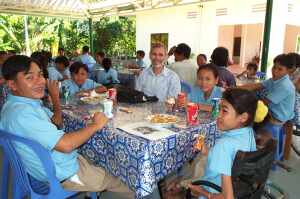 The Marist Brothers of Australia are one of the groups that has strong links with Maryknoll here in Cambodia. The two or three brothers in Phnom Penh come to the Maryknoll house for liturgy and supper on Wednesdays, we see them on Saturday evening at the international English mass, and when it came time for them to build a new school for disabled children, Maryknoll helped with money.
The Marist Brothers of Australia are one of the groups that has strong links with Maryknoll here in Cambodia. The two or three brothers in Phnom Penh come to the Maryknoll house for liturgy and supper on Wednesdays, we see them on Saturday evening at the international English mass, and when it came time for them to build a new school for disabled children, Maryknoll helped with money.
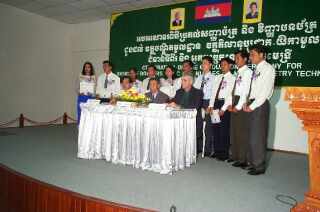 On Friday I went to the graduation exercises for Maryknoll Father John Barth's Basic Eye Doctor and Basic Eye Nurse program. At a hospital he established in the province of Takeo, John trains medical teams to do basic eye surgery, and Friday's ceremony at the Ministry of Health building was to recognize the second group to finish their training. I was taking pictures for John to send to the European donors who sponsor the training, and looking through the viewfinder, it occurred to me that all the nurses (of a group of 10) were men except for three. Women just don't have the opportunity for primary and secondary education to allow them to go on for higher studies such as this program. Too often with limited resources for education available in a family, they go to the sons, and the daughters take on the child-care and housekeeping roles while the mothers work as street vendors or in the shops and markets.
On Friday I went to the graduation exercises for Maryknoll Father John Barth's Basic Eye Doctor and Basic Eye Nurse program. At a hospital he established in the province of Takeo, John trains medical teams to do basic eye surgery, and Friday's ceremony at the Ministry of Health building was to recognize the second group to finish their training. I was taking pictures for John to send to the European donors who sponsor the training, and looking through the viewfinder, it occurred to me that all the nurses (of a group of 10) were men except for three. Women just don't have the opportunity for primary and secondary education to allow them to go on for higher studies such as this program. Too often with limited resources for education available in a family, they go to the sons, and the daughters take on the child-care and housekeeping roles while the mothers work as street vendors or in the shops and markets.